Baby powder is currently at the center of thousands of lawsuits for its connection to ovarian cancer and mesothelioma. Traditionally, baby powder has been a staple in many women’s personal hygiene routines. In fact, women have been using baby powder as a feminine hygiene product for decades to control sweat and odor. However, as science continues to strengthen the link between baby powder and ovarian cancer, many women have sought alternatives to talc. With women putting their health first, sales for the product have declined significantly. So much so, that in May 2020, Johnson & Johnson announced that it will stop selling talc-based baby powder.
Research has long indicated that talcum powder usage can cause inflammation and increase the risks of ovarian cancer in women. When used by women as a part of their hygiene routine, talcum powder particles can travel through the vagina into the uterus and fallopian tubes, ending up in the ovaries. In other words, for more than 100 years, women have unknowingly been using the powder near their genitals, unaware of the potentially dire consequences.
How does talcum powder cause cancer?
In its natural form, talc, a fine powdery substance, may become embedded in the ovarian walls. In the 1970s, British researchers began looking at ovarian tumors and found talc particles deeply embedded in 76% of the ovarian tumors they observed. Researchers concluded that talc is likely to increase the risks of ovarian cancer. Additionally, talc may also contain asbestos – a well-known carcinogen.
In 2013, a journal from Cancer Prevention Research showed that women have a 20-30% greater risk of developing ovarian cancer when using a product with talcum powder around their groin area.
Talcum Powder in Black and Brown Communities
Johnson & Johnson considered increasing its marketing efforts to Hispanic women long after the company had acknowledged health concerns. In other words, those efforts came about even though Hispanic women were already purchasing the product in high numbers. In fact, Johnson’s baby powder has a high usage rate among Hispanic women at 37.6%.
However, targeting non-white populations did not stop there, Johnson & Johnson shifted their approach and began targeting Black women. In its aggressive marketing, the company went as far as dropping off as many as 100,000 sample bags at churches and beauty salons in predominately Black and Hispanic communities. Black women make up to 60% of baby powder users—putting these women at a significantly higher risk for ovarian cancer.
Johnson & Johnson marketed its dangerous product as a way to help its consumers stay fresh and dry. Its marketing tactics for baby powder took advantage of pervasive cultural myths about cleanliness and odors that persist in the Black community. These myths continue to compel Black women to control body odor at higher rates than other women.
The 5 Best Alternatives to Talcum Powder
If kicking your talcum powder to the curb is on your to-do list, consider the following alternatives to talc:
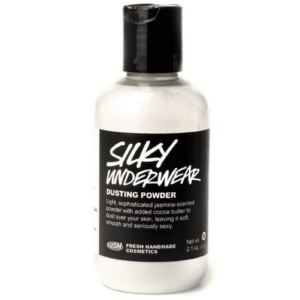
5. Lush Silky Underwear Dusting Powder – $10.95
If you can’t give up the powder, opt for a dusting that contains corn starch or kaolin. Lush’s Silky Underwear Dusting Powder is a talc alternative that will absorb moisture and keep you dry, all while fresh-scented! This product is safe for all-over use and has jasmine and vetiver scents.
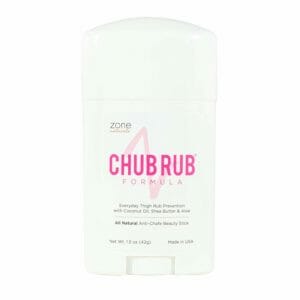
4. Chub Rub Formula by Zone Naturals – $11.99
If chaffing is your problem, the Chub Rub stick may just be your answer! Talc-free, of course, can be applied between the thighs or anywhere else chaffing may occur safely. This product is made from organic coconut oil and helps skin glide easier.
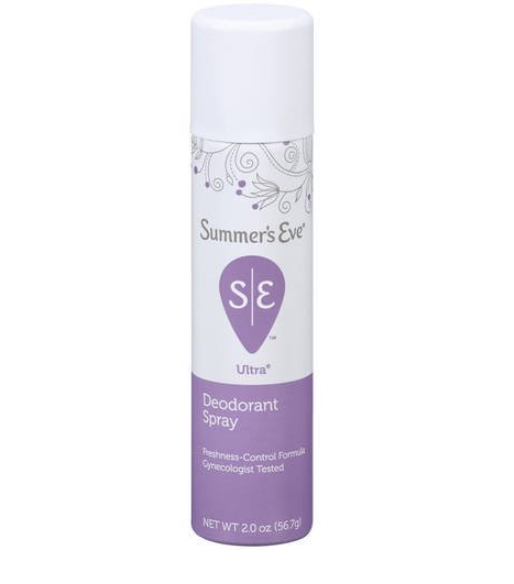
3. Summer’s Eve Freshening Spray – $2.99 – $5.99
Powders that don’t contain talc still risk migrating through women’s reproductive systems and embedding into the ovarian walls. A great alternative is Summer’s Eve offers a feminine deodorant spray to offer you freshness throughout the day. The spray comes in various scents and is readily available in most department stores and chain discount stores on average for $2.99-$5.99.
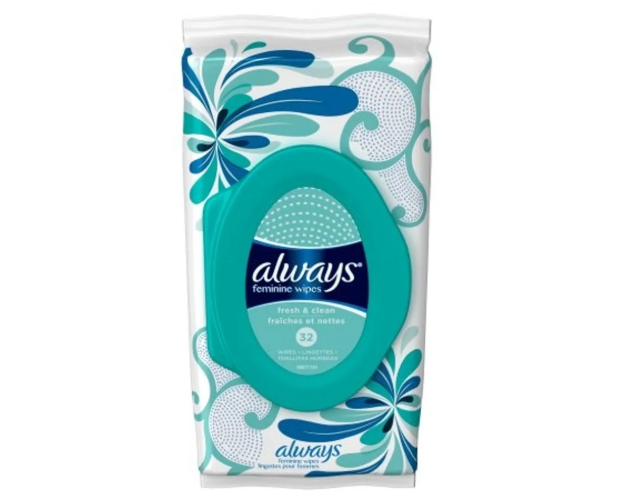
2. Always Fresh and Clean Wipes – $3.99
Opt for Always Fresh & Clean wipes to freshen up quickly after a workout, using the bathroom or just because you want a boost in freshness. You can opt for a resealable package to keep in the home bathroom or the more discreet individually wrapped wipes if you’re on the go. Always wipes are available for a few dollars at most department stores and chain discount stores.
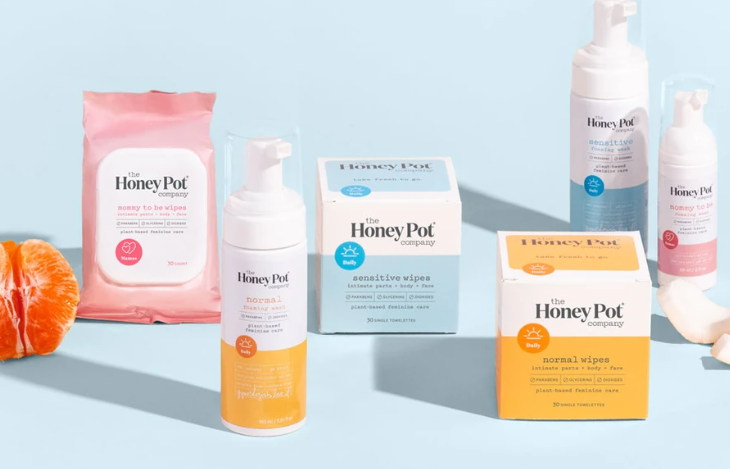
1. Honey Pot’s Cleanse – $7.99 – $9.99
Honey Pot is a new company offering an entire line of feminine hygiene products from washes and on-the-go wipes called Cleanse. You can purchase the products based on your skin’s sensitivity to the ingredients used. The company even offers specially formulated, all-natural products for pregnant women. Honey Pot makes ditching the dependence on large corporations’ products easy. Honey Pot is available online and at Target.
It’s Time to Ditch the Talcum Powder
Some of the above products are pricey but might be worth it for peace of mind. If cost is a concern, you may consider making your own homemade products as an alternative to talc. If you’re committed to ditching talc, but need an alternative that is close to the cost of baby powder, here are a few ingredients that you can use to make homemade hygiene products:
- Cornstarch: Found in the baking aisle of your local grocery store, cornstarch is a great natural alternative to talc. The consistency is exactly the same, so it too will help rid you of any moisture. Derived from the endosperm of a corn kernel, cornstarch is often used to help thicken sauces.
- Arrowroot starch or tapioca starch: Both of these starches are all-natural alternatives to talc. Several South American plants make up arrowroot. Tapioca starch is derived from the crushed-up pulp of the South American cassava plant, a woody shrub.
- Baking soda: You thought that useful sodium bicarbonate, otherwise known as baking soda, only had 100 uses. Well, there just so happens to be one more: This common pantry item can be used in place of baby powder. Not to mention, some people even use it as deodorant, applying some to their underarms each morning.
The Carlson Law Firm has been representing women who have been diagnosed with ovarian cancer, as well as family members who have lost mothers, wives and companionship as a result of Johnson & Johnson’s negligence.
Johnson & Johnson Talcum Powder Lawsuits
Thousands of consumers have filed talcum powder lawsuits against the pharmaceutical giant, Johnson & Johnson. These lawsuits showcase the pharmaceutical company’s failure to adequately warn women of the potential risk of developing ovarian cancer for the use of its popular baby powder.
Although filing a claim will not turn back time, a claim could help alleviate the stress from the piling medical bill and other expenses victims face. Compensation for talcum powder lawsuits includes pain, suffering, medical bills, lost wages, and funeral expenses in the case of a loved one’s death and more.
As previously stated, if using talcum powder caused you harm, the company that made the product should be held accountable. These manufacturers ignorantly put their profits about their consumer’s safety and will only continue to try to protect those profits.
How The Carlson Law Firm Can Help
If you or someone you know have developed a serious illness after using a product with talc or talcum powder, it may be in your best interest to contact a Talcum Powder Lawsuit Lawyer as soon as possible. The Carlson Law Firm has experience with these types of cases and may be able to help you get the compensation you deserve. The Carlson Law Firm has a team of compassionate attorneys, on-staff nurses and private investigators ready to invest heavily in your case. We care, we can help.
We offer several convenient options to discuss your legal situation with a team member. Contact The Carlson Law Firm at 1-800-359-5690, click the chat option below or fill out a contact form. We serve clients nationwide.





